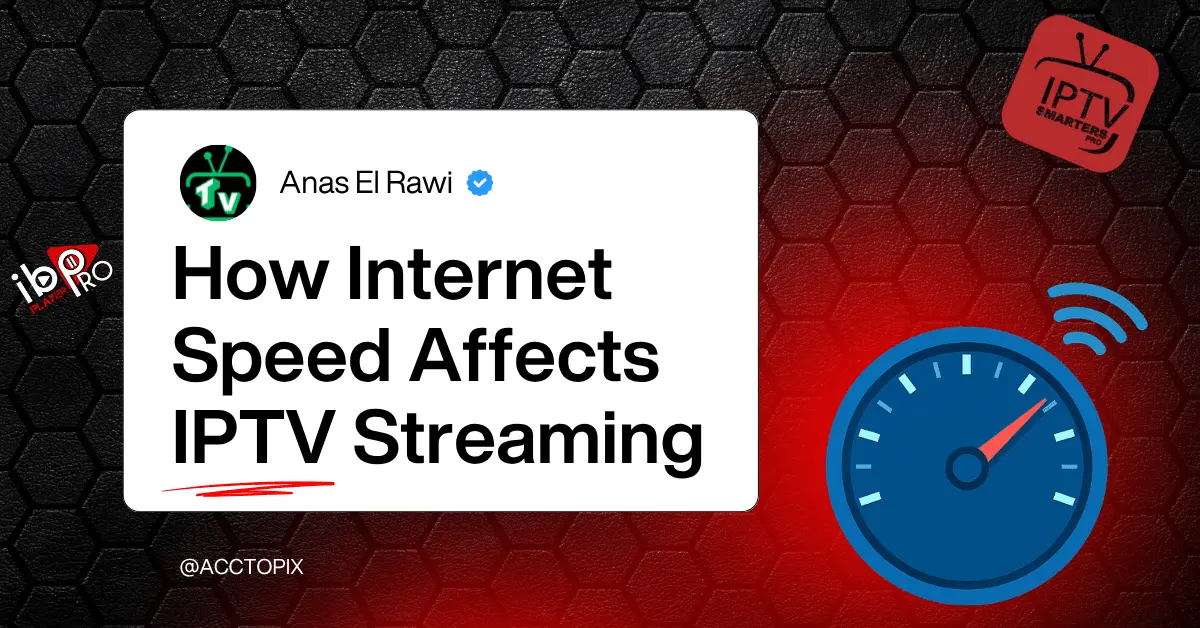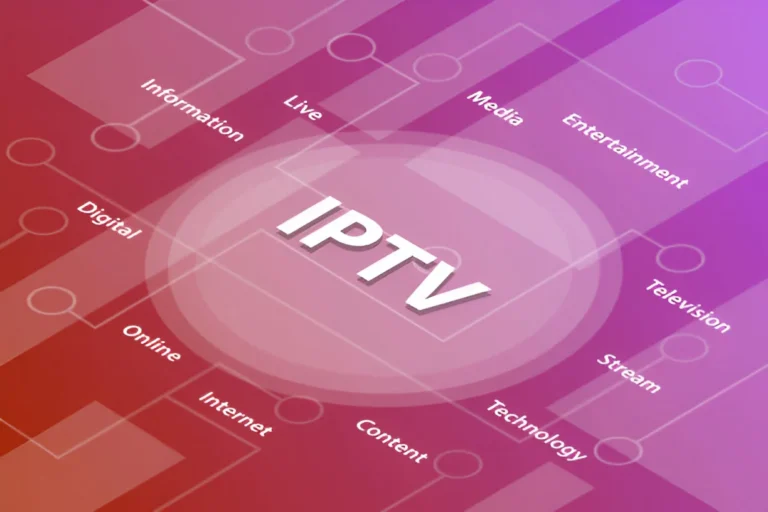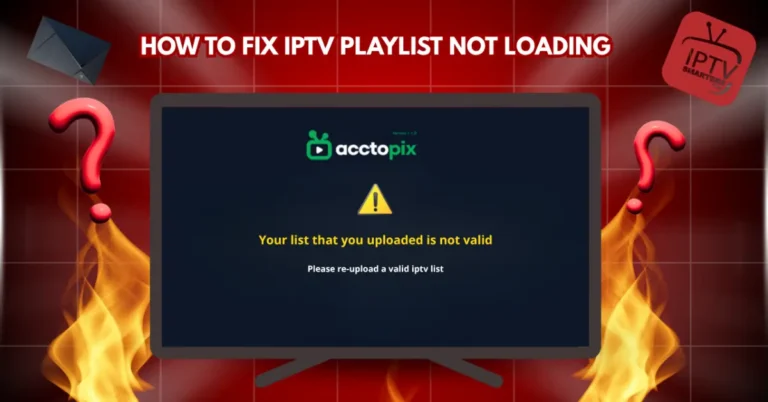Table of Contents
- Understanding IPTV and Internet Speed Requirements
- Minimum Internet Speed Requirements by Video Quality
- Why IPTV Needs More Bandwidth Than Regular Streaming
- Factors That Affect Your IPTV Streaming Experience
- Internet Speed Requirements Comparison Table
- How to Test Your Internet Speed for IPTV
- Solutions to Improve Your IPTV Streaming
- Troubleshooting Common IPTV Speed Issues
- Regional Considerations for IPTV Streaming
- FAQ: Internet Speed and IPTV Streaming
Let’s be honest – nothing ruins a good TV show like constant buffering. After working with IPTV systems for over a decade, I’ve seen countless users struggle with streaming issues that could easily be fixed with the right internet setup. Your connection speed isn’t just a number on your ISP bill; it’s what stands between you and that perfect binge-watching session.
What You Really Need to Know About IPTV and Internet Speed
Here’s the thing about IPTV – it’s pickier than your average streaming service. While Netflix can buffer ahead and give you some breathing room, IPTV streams live content that demands your full internet attention right now. No second chances, no “let me catch up later.”
I’ve tested dozens of setups, and the pattern is always the same: your internet speed determines everything. Too slow, and you’re watching pixelated mess. Just right, and you’re golden. But here’s what most people don’t realize – it’s not just about raw speed.
The Real Numbers You Need (Not the Marketing Fluff)
Forget what your IPTV provider’s FAQ says about “minimum requirements.” I’m giving you the numbers that actually work in real homes with real internet connections.
Standard Definition – The Bare Minimum
You can get away with 3-5 Mbps for SD content, but honestly? It’s 2025. Unless you’re seriously budget-constrained or dealing with limited rural internet, there’s no reason to torture yourself with SD quality. That said, it works for basic viewing on smaller screens.
HD Streaming – The Sweet Spot
Most people land here, and for good reason. You’ll want 8-12 Mbps per stream – not the 5 Mbps minimum that providers love to advertise. Trust me on this. I’ve seen too many people frustrated with 5 Mbps connections that technically work but constantly hover on the edge of disaster.
4K Ultra HD – Where Things Get Serious
This is where IPTV providers separate from the pretenders. You absolutely need 25 Mbps minimum, but I recommend 40-50 Mbps if you want to actually enjoy the experience. 4K IPTV isn’t just about the pretty pictures – it’s about having enough bandwidth headroom so your stream doesn’t crash every time someone else opens YouTube.
The Multiple Device Reality Check
Here’s where most families get blindsided. These speeds are per stream. Got three kids watching different channels while you catch the game? Multiply accordingly. A typical family setup watching HD content really needs 60-80 Mbps to avoid the “who’s hogging the internet” arguments.
Looking for rock-solid IPTV that works with your current internet?
ACCTOPIX delivers over 30,000 premium channels optimized for various connection speeds. Whether you’re working with basic broadband or gigabit fiber, our streams adapt to give you the best possible quality. Grab your free trial at ACCTOPIX.COM and see the difference proper optimization makes – no more guessing if your internet can handle it.
Why IPTV Eats More Bandwidth Than Netflix
People always ask me this, and the answer isn’t what they expect. It’s not that IPTV is poorly designed – it’s just fundamentally different.
Live Content Can’t Wait: When you watch Netflix, the service downloads chunks of video ahead of time. IPTV doesn’t have that luxury. Every frame arrives exactly when you need to see it, which means your connection can’t take breaks.
Background Processes Are Bandwidth Thieves: Your IPTV service isn’t just sending you one video stream. It’s updating channel guides, maintaining connection heartbeats, sometimes even pre-loading channel previews. All of this adds up.
Less Aggressive Compression: Netflix has hours to compress a movie file perfectly. IPTV has milliseconds to compress and transmit live content. The result? Bigger files that need more bandwidth.
I’ve measured this in real-world scenarios, and IPTV typically uses 15-25% more bandwidth than equivalent quality streaming video. It’s just the price of watching live content.
Factors That Affect Your IPTV Streaming Experience
Network Stability and Consistency
Your connection’s stability matters more than peak speed for IPTV streaming. A consistent 20 Mbps connection performs better than a fluctuating 50 Mbps connection with frequent drops. Jitter and packet loss can cause more streaming issues than slightly slower speeds.
Connection Type Impact
Fiber Optic: Provides the most stable and fastest connections with minimal latency, ideal for 4K IPTV streaming. Cable Internet: Offers good speeds but may experience congestion during peak hours in shared neighborhood networks. DSL: Generally provides consistent speeds but may have lower maximum bandwidth limits. Satellite Internet: Often includes data caps and higher latency, making it less suitable for extensive IPTV usage.
Peak Traffic Hours
Internet speeds typically slow during peak usage times (6 PM – 11 PM) when neighborhood networks experience high demand. Plan your IPTV viewing accordingly or consider upgrading to higher speed tiers to maintain quality during these periods.
Device and Equipment Performance
Your router, modem, and streaming device capabilities significantly impact IPTV performance. Older equipment may create bottlenecks even with sufficient internet speeds. Ensure your hardware supports the speeds you’re paying for.
Internet Speed Requirements Comparison Table
| Video Quality | Minimum Speed | Recommended Speed | Optimal Speed | Multiple Devices (4 streams) |
|---|---|---|---|---|
| SD (480p) | 3 Mbps | 5 Mbps | 8 Mbps | 32 Mbps |
| HD (720p) | 5 Mbps | 8 Mbps | 12 Mbps | 48 Mbps |
| Full HD (1080p) | 8 Mbps | 15 Mbps | 20 Mbps | 80 Mbps |
| 4K UHD | 25 Mbps | 40 Mbps | 60 Mbps | 240 Mbps |
| 8K (Future) | 80 Mbps | 120 Mbps | 200 Mbps | 800 Mbps |
Note: These speeds represent download requirements. Upload speeds of 5-10 Mbps are generally sufficient for IPTV streaming.
How to Test Your Internet Speed for IPTV
Reliable Speed Testing Methods
- Use Multiple Test Sites: Test your speed using Speedtest.net, Fast.com, and Google’s speed test for comprehensive results.
- Test at Different Times: Check speeds during peak hours (evening) and off-peak times to understand daily variations.
- Test on Different Devices: Compare speeds on various devices to identify potential hardware limitations.
- Use Wired Connections: Test both wired (Ethernet) and wireless connections to measure WiFi performance impact.
Key Metrics to Monitor
- Download Speed: Most critical for IPTV streaming quality
- Upload Speed: Important for interactive IPTV features
- Ping/Latency: Should be under 50ms for optimal performance
- Jitter: Variation in latency; lower is better for live streaming
Speed Testing Best Practices
Close all unnecessary applications and pause downloads before testing. Run multiple tests 10 minutes apart and calculate the average for accurate results. Test from the same device you’ll use for IPTV streaming to ensure realistic measurements.
Solutions to Improve Your IPTV Streaming
Network Optimization Strategies
Upgrade Your Internet Plan: If your current speeds consistently fall below IPTV requirements, contact your ISP about higher-tier plans. Consider gigabit internet for households with multiple 4K streaming devices.
Use Wired Connections: Ethernet connections provide more stable speeds than WiFi. Run an Ethernet cable directly to your IPTV device when possible for the most reliable connection.
Optimize WiFi Performance: Position your router centrally, away from interference sources. Upgrade to WiFi 6 routers for better performance with multiple devices. Use 5GHz bands for IPTV devices when available.
Quality of Service (QoS) Configuration
Configure your router’s QoS settings to prioritize IPTV traffic over other internet activities. This ensures streaming gets bandwidth priority during network congestion. Many modern routers include gaming or streaming modes that automatically optimize these settings.
Router and Equipment Upgrades
Modern Router Requirements: Use routers supporting your internet speed tier with sufficient WiFi standards (WiFi 5 or WiFi 6). IPTV Device Specifications: Ensure your streaming device supports your desired video quality and has adequate processing power. Network Switches: For multiple wired devices, use gigabit network switches to maintain full speed connections.
Troubleshooting Common IPTV Speed Issues
Identifying Speed-Related Problems
Buffering Symptoms: Frequent pausing indicates insufficient bandwidth or unstable connections. Quality Drops: Automatic resolution reduction suggests borderline speed capabilities. Connection Timeouts: Complete stream failures often indicate severe speed or stability issues.
Quick Fix Solutions
- Restart Your Network Equipment: Power cycle your modem and router to refresh connections.
- Close Background Applications: Stop downloads, updates, and streaming on other devices.
- Switch to Wired Connection: Temporarily use Ethernet to eliminate WiFi-related issues.
- Change IPTV Server: If your provider offers multiple servers, test different options for better performance.
Advanced Troubleshooting Steps
Check for ISP Throttling: Some internet providers throttle streaming traffic during peak hours. Use a VPN to test if speeds improve with encrypted traffic. Monitor Network Usage: Identify bandwidth-heavy devices or applications competing with your IPTV stream. Test Different DNS Servers: Switch to public DNS servers (8.8.8.8 or 1.1.1.1) to potentially improve connection routing.
Regional Considerations for IPTV Streaming
Global Internet Infrastructure Variations
North America: Generally offers high-speed fiber and cable options in urban areas, with speeds sufficient for 4K IPTV streaming. Europe: Excellent fiber infrastructure in most countries, with competitive pricing for high-speed internet plans. Asia-Pacific: Leading in fiber deployment with some of the world’s fastest average internet speeds. Developing Regions: May have limited high-speed options, making SD and HD IPTV more practical than 4K streaming.
ISP-Specific Considerations
Different internet service providers may have varying performance characteristics for IPTV streaming. Research local ISP reviews and speed test results in your area before choosing a provider for IPTV use.
FAQ: Internet Speed and IPTV Streaming
Q: What internet speed do I actually need for IPTV? A: Skip the marketing minimums. For HD, get 10-12 Mbps per stream. For 4K, budget 40-50 Mbps. These numbers account for real-world conditions, not laboratory perfect scenarios.
Q: My internet is fast but IPTV still buffers. What gives? A: Speed isn’t everything. Check your WiFi signal strength, router age, and whether other devices are hogging bandwidth. Sometimes a $30 Ethernet cable fixes what expensive internet upgrades can’t.
Q: Can I really watch 4K IPTV with basic internet? A: Technically, 25 Mbps works for 4K, but you’ll hate the experience. Buffering during action scenes, quality drops when the neighbor starts downloading – save yourself the frustration and get proper bandwidth.
Q: How many people can watch IPTV on one connection? A: Depends on what speed you’re paying for and what quality they want. Four people watching HD comfortably? You’ll want at least 60-80 Mbps total. Do the math based on your household’s viewing habits.
Q: Why does my IPTV work better at 2 AM than 8 PM? A: Network congestion. Your ISP’s infrastructure gets crowded during peak hours. It’s like rush hour traffic – same roads, more cars, everything moves slower.
Q: Should I pay extra for faster upload speeds? A: For watching IPTV? Nah. Upload speeds matter for video calls and gaming, but IPTV is all about download speed. Save your money for faster download tiers instead.
Bottom Line: Get Your Internet Right, Get Your IPTV Right
After helping hundreds of people optimize their IPTV setups, the pattern is clear: most streaming problems trace back to internet issues. Not router problems, not app glitches – internet speed and stability.
Don’t cheap out on bandwidth if you’re serious about IPTV. The difference between “minimum requirements” and “comfortable viewing” is usually $10-20 per month in internet costs. Compare that to the frustration of constantly buffering streams, and it’s the easiest decision you’ll make.
Want to test if your current internet can handle quality IPTV? ACCTOPIX offers a free trial that’ll show you exactly what your connection can deliver. Visit ACCTOPIX.COM and see if you need to call your ISP or if you’re already good to go.




